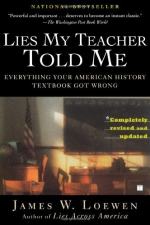|
This section contains 1,141 words (approx. 3 pages at 400 words per page) |

|
Chapter 9, Summary and Analysis
"Down the Memory Hole: The Disappearance of the Recent Past" examines how textbooks deal with times people still alive remember. Many African societies divide humans into three categories: those alive, the "sasha" (recently-departed, living-dead), and the "zamani" (the dead - those of whom no one has immediate memories). When reading about "sasha" events (e.g., the Persian Gulf War), Americans judge how the authors have gotten it right or wrong based on their own experience. For the distant past, they necessarily read less critically and more reverently. Because the recent past tends to be controversial, textbooks avoid it. The narrative textbooks devote progressively fewer pages to each decade since the 1930s, while the inquiry texts, seeking to make history relevant to current events, do not scrimp. The inquiry texts are out of print and the genre appears not to be commercially...
(read more from the Chapter 9, Summary)
|
This section contains 1,141 words (approx. 3 pages at 400 words per page) |

|




